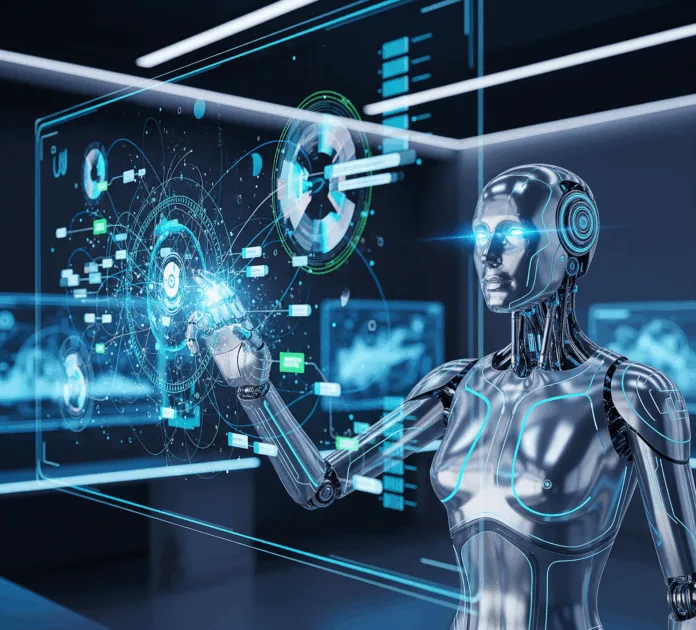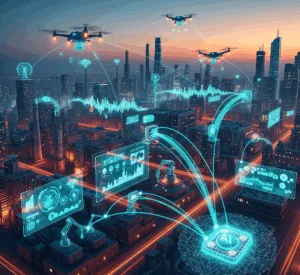
AI Agents in 2025: Top Trends, Tools, and Innovations You Need to Know

The landscape of artificial intelligence is evolving rapidly, and at the heart of this transformation are AI Agents in 2025—intelligent systems capable of perception, reasoning, and autonomous action. These agents are no longer just a concept from academic theory; they are becoming central to how businesses, applications, and digital ecosystems operate.
In this article, we’ll explore the most influential trends, cutting-edge tools, and breakthrough innovations shaping AI agents in 2025. Whether you’re a tech enthusiast, developer, or business leader, understanding these advances will help you stay ahead of the AI curve.
What Are AI Agents?
An AI agent is a software entity that perceives its environment, processes data, and takes autonomous action toward achieving defined goals. These agents can be reactive (responding to changes), deliberative (planning actions based on goals), or a combination of both.
In 2025, AI agents have become more intelligent, autonomous, and widely adopted across industries. Powered by advanced machine learning, real-time data analysis, and cloud infrastructure, these systems are now capable of executing complex tasks without human intervention.
Key Trends Driving AI Agents in 2025
- Rise of Autonomous AI Agents: The push toward automation has led to the creation of autonomous AI agents that can operate independently in dynamic environments. From robotic process automation (RPA) to self-driving vehicles and intelligent customer support bots, these agents reduce human workload and increase operational efficiency.
- Integration with IoT and Edge Computing: In 2025, AI agents are increasingly embedded in IoT devices and powered by edge computing, allowing real-time processing and decision-making at the source of data. For example, smart surveillance systems can detect threats instantly, while industrial AI agents can adjust machinery operations on the fly.
- Personalized AI Assistants: AI agents are no longer generic digital helpers. Instead, they are evolving into personalized virtual assistants capable of understanding user preferences, context, and behavioral patterns. These agents handle scheduling, communication, and even personal finance management with near-human intelligence.
- Explainable and Transparent AI Agents: One major challenge has been the black-box nature of AI. In 2025, new innovations ensure that intelligent agents provide transparency in decision-making. Explainable AI (XAI) technologies are being integrated into AI agents to improve accountability, especially in high-stakes environments like healthcare and finance.
Essential Tools Empowering AI Agents in 2025
The development and deployment of AI agents rely heavily on a growing ecosystem of AI tools. Here are some of the most impactful tools in 2025:
- AutoML Platforms: Automated Machine Learning (AutoML) platforms simplify the creation of custom AI agents by automating feature engineering, model selection, and tuning.
- OpenAI Function Call Frameworks: Modern AI tools in 2025 include frameworks that allow agents to interact with APIs and databases autonomously—expanding their practical use across workflows.
- Cognitive Architectures: Platforms like ACT-R and SOAR enable the creation of agents that simulate human-like reasoning, memory, and learning.
- Multi-Agent Systems (MAS) Platforms: These platforms allow multiple AI agents to work in coordination, making collaborative decisions in environments like traffic control, simulations, and gaming.
Real-World Applications of AI Agents in 2025

Healthcare: AI agents assist in diagnostics, drug discovery, and patient monitoring, significantly reducing diagnosis time and improving outcomes. Learn more about AI agents in healthcare.
- Finance: Autonomous AI agents analyze market trends, detect fraud, and even execute trades with higher speed and accuracy than human traders.
- Retail and E-commerce: Intelligent agents handle inventory management, customer queries, and personalized product recommendations, enhancing user experience and sales.
- Cybersecurity: AI agents monitor network activity in real time, flagging threats, initiating countermeasures, and learning from evolving attack patterns.
- Education: AI tutors adapt to student learning styles, providing real-time feedback, practice questions, and progress tracking—transforming personalized learning. Explore more real-world AI agent examples.
What the Future Holds for AI Agents
As we move deeper into the decade, the future of AI will be shaped by continuous improvements in agent autonomy, ethical AI governance, and real-time adaptability. The ability of AI agents to learn on the go, adjust to unpredictable environments, and interact with humans more naturally will define their next evolution.
Moreover, hybrid systems combining symbolic reasoning and deep learning are becoming standard. These intelligent agents will not just follow commands but offer strategic insights, helping businesses and individuals make better decisions faster.
Conclusion
AI Agents in 2025 represent a groundbreaking leap in the way we think about automation, intelligence, and digital assistance. From autonomous operations to decision support systems, these agents are becoming indispensable across industries.https://mus-tech.info/ai-and-ethics-navigating-automation-s-moral-dilemmas/
As innovations continue to unfold, staying informed about the latest artificial intelligence trends, tools, and applications of intelligent agents will be crucial for anyone involved in tech. Discover top AI agent trends for 2025.